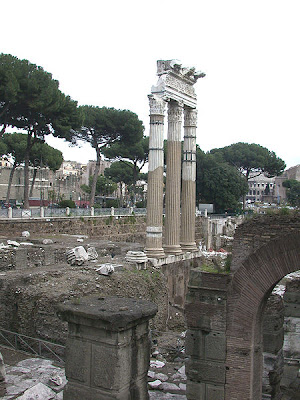 |
| Temple of Venus. Forum of Caesar, Rome. wikimedia |
Goddess Venus
 |
| Venus de Milo. Louvre, Paris wikimedia |
Egypt
Egyptian hieroglyphs use a technical name ba'ah or seba-djai(glossary).
Note that ancient Egyptians did not call the planet by the name of some major female goddess such as Isis or Hathor.
Babylon
Because it is so beautiful the planet was associated early on in Near Eastern civilizations with a woman - for who is more beautiful then she? Babylonian astronomers called the planet the "bright Queen of the Sky" and carefully observed its ascensions
The Venus tablet of Ammisaduqa (Enuma Anu Enlil Tablet 63) refers to the record of astronomical observations of Venus, as preserved in numerous cuneiform tablets dating from the first millennium BCE. It is believed that this astronomical record was first compiled during the reign of King Ammisaduqa (or Ammizaduga), the fourth ruler after Hammurabi. Thus, the origins of this text should probably be dated to around the mid-seventeenth century BCE. The tablet recorded the rise times of Venus and its first and last visibility on the horizon before or after sunrise and sunset (the heliacal risings and settings of Venus) in the form of lunar dates. These observations are recorded for a period of 21 years.
wikipedia
wikipedia
Sumerian Zib/Zig Babylonian Dele-bat the planet was closely associated with the goddess of love Ishtar.
Biblical Israel
The Hebrews called the planet neutrally Helel (הֵילֵל)- "the shining one" - as in the famous text of Jesaiah 14:3-20.
The Book of Jeremiah strictly condemns the worship of the Queen of Heaven - apparently the Babylonian goddess whose cult had spread to Judea and Jerusalem.
The children gather wood, the fathers light the fire, and the women knead the dough and make cakes of bread for the Queen of Heaven. They pour out drink offerings to other gods to provoke me to anger.
Jeremiah 7:18
Then all the men who knew that their wives were burning incense to other gods, along with all the women who were present—a large assembly—and all the people living in Lower and Upper Egypt, said to Jeremiah, "We will not listen to the message you have spoken to us in the name of the LORD! We will certainly do everything we said we would: We will burn incense to the Queen of Heaven and will pour out drink offerings to her just as we and our fathers, our kings and our officials did in the towns of Judah and in the streets of Jerusalem. At that time we had plenty of food and were well off and suffered no harm. But ever since we stopped burning incense to the Queen of Heaven and pouring out drink offerings to her, we have had nothing and have been perishing by sword and famine.
Jeremiah 44:15-18
Jeremiah 7:18
Then all the men who knew that their wives were burning incense to other gods, along with all the women who were present—a large assembly—and all the people living in Lower and Upper Egypt, said to Jeremiah, "We will not listen to the message you have spoken to us in the name of the LORD! We will certainly do everything we said we would: We will burn incense to the Queen of Heaven and will pour out drink offerings to her just as we and our fathers, our kings and our officials did in the towns of Judah and in the streets of Jerusalem. At that time we had plenty of food and were well off and suffered no harm. But ever since we stopped burning incense to the Queen of Heaven and pouring out drink offerings to her, we have had nothing and have been perishing by sword and famine.
Jeremiah 44:15-18
Greece
Ancient Greeks called the morning star Phosphorus (Φωσφόρος)- "the one carrying light" - the one who brings the morning light just before sunset. The evening star was originally considered a different one and was called Hesperus (Ἓσπερος)
Note that the Greeks did not call the planet by the name of some major female goddess such as Aphrodite or Hera.
Or did they?
Rome
Ancient Romans called the Morning star according to the Greek tradition Lucifer "the one carrying light" and the Evening star Vesper.
Note that the Romans did not call the planet by the name of some major female goddess such as Venus or Diana.
Or di they? I am confused...
Arabic
In Arabic language planet Venus is called Zuhra الزُّهْرَة
I am not sure what it means in Arabic. Could it be connected with zahira, waking up, as Morning Star?
In any case, in the Islamic world this names is not related to any idol name.
(From the Arabic name of Venus comes the popular name for girls, Zuharah.)
Alchemy and Astrology
Alchemic symbol of copper and planet Venus
Conclusion
Babylonian astronomers associated their gods with the classical planets and called the brightest and most beautiful after the goddess of love and beauty, Ishtar. The associations were important for Astrology.Alchemy and Astrology
Alchemic symbol of copper and planet Venus
Conclusion
Greeks may have learned about these divine planet names from the famous wise men of Babylon. They adopted only the idea of divine name and replaced the Babylonian god names with the corresponding god names from their own Olympic pantheon. This would have given the name Aphrodite to Phosphor - possibly quite late in history, in the Hellenistic period perhaps?
The Romans would have easily replaced the Greek god names with the names of their own corresponding divinities, so that Aphrodite would have become Venus. However, they also knew Phosphorus and called it Lucifer and Hesperos called Vesper.
So it is a bit confusing when and in which ancient sources the most beautiful of planets was first called Venus/Aphrodite.
P.S. See also the nice explanation given by Sean Caruna Webster in AllExperts

No comments:
Post a Comment